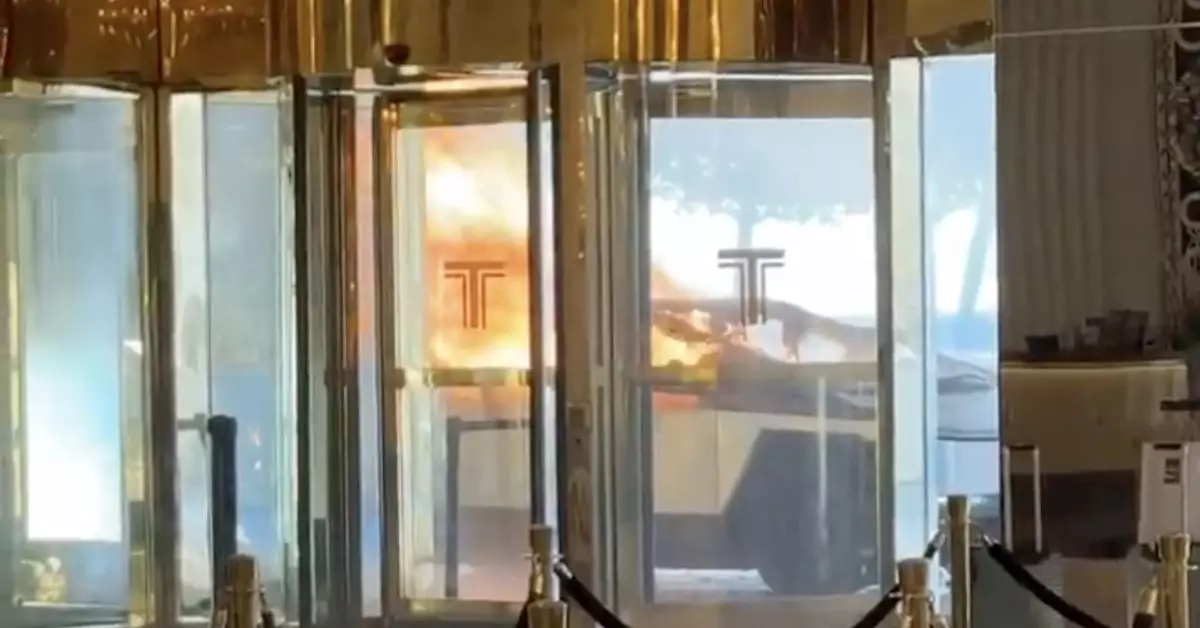On a seemingly ordinary Wednesday morning, an unexpected and alarming incident unfolded outside the Trump International Hotel in Las Vegas, Nevada. A Tesla Cybertruck reportedly erupted into flames, alarming onlookers and drawing the attention of local authorities. A video shared via X (formerly Twitter) captured the dramatic moment, depicting the futuristic vehicle engulfed in an inferno. The chaotic scene raised immediate concerns about vehicle safety and the circumstances surrounding the fire.
Hasty conclusions about the incident emerged almost instantly. Eyewitnesses claimed the Cybertruck “blew up,” though such statements were likely exaggerated amidst the confusion. It underscores the tendency of social media to amplify sensations without fully analyzing the particulars of incidents. As of now, the official cause of the fire remains unknown, prompting the Las Vegas Metropolitan Police to launch an investigation. Firefighters quickly responded to the emergency call, which originated shortly after 8:40 AM local time. Thankfully, reports suggest that no injuries occurred, though the absence of damage claims does little to quell public concern in a marketplace increasingly driven by technological advancements.
Tesla’s Safety Spotlight: What Does This Mean?
Tesla vehicles have famously been at the forefront of discussions surrounding electric vehicle safety, reliability, and technological breakthroughs. However, incidents such as this raise questions regarding thermal events and electrical fires, particularly as more electric vehicles populate the roads. Tesla, known for its innovative electric powertrain, has faced scrutiny before regarding vehicle malfunctions and fires. Each event adds to a narrative that could impact consumer trust and sales if perceptions sway negatively.
The timing of the incident coincides with growing reports of Tesla CEO Elon Musk’s widening connections to prominent political figures, including former President Donald Trump. Musk’s attendance at Trump’s Mar-a-Lago celebration on New Year’s Eve, followed by reports of him engaging in discussions with influential tech leaders like Amazon’s Jeff Bezos, suggests a deliberate attempt to align himself with the power players shaping the business landscape. While the Cybertruck fire is ultimately an isolated event, it is embedded within a broader context of Tesla’s public image, market performance, and Musk’s multifaceted engagements with political leadership.
The Broader Implications for Tesla and Electric Vehicles
The incident serves as a reminder of the volatility associated with emerging technologies and their acceptance in mainstream society. Electric vehicles, while gaining momentum, still face pressing questions about safety and performance, particularly in high-stakes environments like hotels or densely populated urban settings. As Tesla continues to assert itself as a leader in the electric vehicle market, such incidents could erode public confidence if not addressed transparently and effectively.
In contrast, Musk’s maneuvering within elite networking circles may also play a significant role in shaping the narrative about Tesla moving forward. As consumer expectations for safety and innovation rise, car manufacturers will increasingly navigate political waters that can dictate market reception and regulatory pathways. Ultimately, the Las Vegas fire incident might prompt not just discussions on vehicle safety, but also deeper inquiries into the interplay between technology, politics, and consumer trust that are crucial for the future of electric vehicles.

